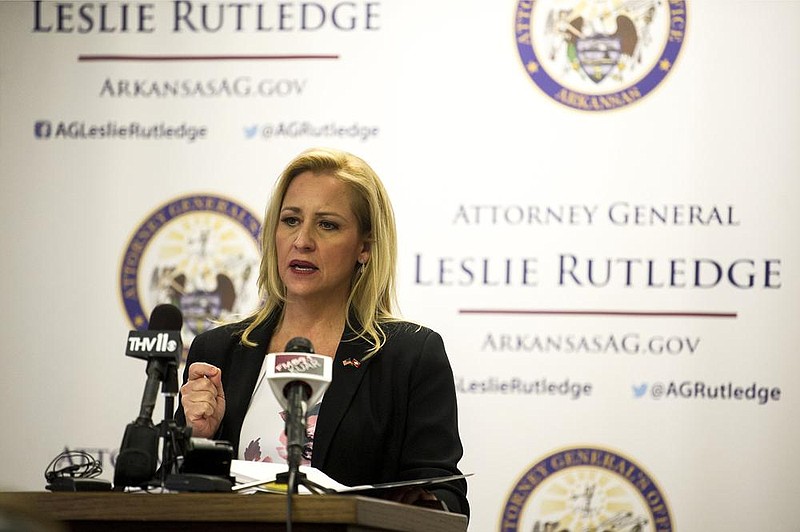Coroners' reports, including certain identifying and medical information for people who died with covid-19, are public under Arkansas law, a state attorney general's opinion released Wednesday says.
Rep. Les Warren, R-Hot Springs, sent Attorney General Leslie Rutledge a request for the opinion just over six months ago at the behest of Garland County attorney John Howard. State legislators are among those who can receive attorney general opinions under Arkansas law.
The request's central question was: "Are the records of county coroners regarding people who have died of COVID-19, or whose deaths are COVID-19 related, subject to public disclosure and release under the Arkansas FOIA?"
The attorney general opinion request came after the Arkansas Democrat-Gazette asked for coroners' death reports from Garland and other counties for those who died with covid-19. The newspaper requested the reports under the Arkansas Freedom of Information Act, which requires most documents produced by government officials in their work to be made public.
Garland County Coroner Stuart Smedley released heavily redacted reports that omitted information such as the deceased's name, age, city of residence, next-of-kin and large portions of the narrative.
The reports serve as a fundamental source for a series called "Lives Remembered," which features people killed by covid-19, as told through interviews with their surviving family members and friends. The project began in the earliest days of the pandemic, when little was known about the coronavirus and how it was affecting people who were infected.
The Democrat-Gazette has requested death reports from dozens of counties since the state announced its first coronavirus death in March. So far, coroners across the state have turned over more than 1,700 reports.
After a public records request in 2020, Garland County's Howard informed the Democrat-Gazette that Smedley was declining to release the reports without heavy redactions.
The newspaper argued that that decision was made in error.
Rutledge's opinion agreed.
"[T]he quoted medical information and the identifying information you mention is subject to public disclosure under the relevant statutes," Rutledge's opinion says, citing in part Ark. Code Ann. 25-19-101.
Howard said in an emailed statement that his office had not received the opinion.
"Upon receipt it will be reviewed and the Garland County Coroner's Office will abide by whatever guidance the Attorney General's office provides," his statement reads. He didn't respond by 6 p.m. after the newspaper sent him a response that included a copy of the opinion, which is publicly available online.
The opinion says the only portion of a coroner's report that's not subject to disclosure is "confidential medical information" that is not quoted in the final report. Medical information that is quoted in a coroner's final report is subject to the transparency law.
Rutledge's opinion left unsettled the county's question about whether a U.S. constitutional right to privacy could apply to coroner's reports because it is a "fact-dependent" answer.
"And I cannot act as a factfinder in issuing opinions," Rutledge wrote. "Therefore, I cannot answer the constitutional question suggested in your opinion request."
Warren's request for an opinion specifically cited the Arkansas Supreme Court's ruling in a 1989 case called McCambridge v. City of Little Rock as it related to the right to privacy.
The McCambridge decision found that some material in possession of the Little Rock Police Department was blocked from disclosure.
However, citing the U.S. Supreme Court, the state's high court found that the constitutional right to privacy "does not prevent disclosure of 'a record of an official act such as an arrest.'"
A death report is created by a coroner's official act, and Arkansas law states that the report is a public record, said John Tull, an attorney who represents the Arkansas Press Association and a leading expert on the state's transparency law.
"McCambridge was [about] private correspondence between a mother and child that happened to have been gathered by the Little Rock Police Department in [a criminal] investigation," Tull said. "That's a pretty clear contrast to me."
Further, Tull said, the coroner likely lacks standing to invoke a right to privacy because the coroner's privacy isn't at issue.
"I think clearly the intention is those coroner reports are subject to the Arkansas Freedom of Information Act," Tull said.
Eliza Gaines, the managing editor of the Democrat-Gazette, said the opinion lines up with the newspaper's stance on the issue.
"This aligns with our stance that medical information on coroner's reports for Covid-related deaths should be released," Gaines said in an emailed statement. "This information is public record under Arkansas law and helps us have a better understanding of Covid-19 deaths in our communities."
Warren's request for the attorney general's opinion was dated July 22. Generally, Arkansas law requires that public records be made available within three days of the request. The attorney general's office issued its five-page opinion Wednesday.
"This amount of time is not unusual because each opinion request is unique in terms of the question asked and legal research required, and we have many levels of review that opinions go through before they can be published," Stephanie Sharp, a spokeswoman for the attorney general, wrote in an emailed statement regarding the time it took to issue the opinion. "There's no standard or general response time."
